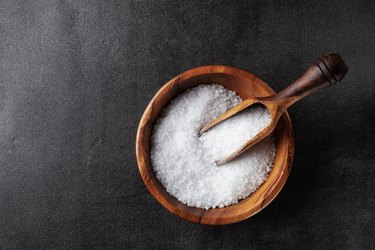
If you have salt-sensitive hypertension, eating a salty meal can cause a dangerous spike in your blood pressure. Hypertension (high blood pressure) makes your heart and blood vessels work harder and less efficiently, and it's a risk factor for heart attacks and strokes, according to the American Heart Association (AHA).
"Salt-sensitive hypertension is commonly seen in people aged 65 and older, individuals with existing kidney disease or reduced kidney function and African Americans, regardless of their age," says George Bakris, MD, a professor of medicine and director of the American Heart Association Comprehensive Hypertension Center at the University of Chicago Medicine. "After a large salty meal, an older, very salt-sensitive individual can have a stroke. The increase in their blood pressure can be very dramatic."
Video of the Day
Video of the Day
For adults, high blood pressure is considered to be 130/80 (often pronounced as 130 over 80) or higher, according to the AHA. That means 130 millimeters of mercury (mm Hg) per deciliter of blood or higher for the systolic pressure (the first, or upper, number) and 80 mm Hg or higher for the diastolic pressure (second, or lower, number).
Read more: Low Sodium Diet: Tips to Reduce Salt Intake
Sodium and Blood Pressure
How much salt is too much salt? AHA recommends no more than 2,300 milligrams of salt per day. "This is one leveled teaspoon of salt, and the average American diet contains 2.5 times more salt," Dr. Bakris says. "That's a lot of salt being eaten."
Most of this salt comes from processed and packaged foods, not the salt shaker.
"One Chinese-style meal has a tremendous amount of salt — 4,000 to 8,000 mg, depending on what you order — and if you are salt sensitive, your blood pressure may increase by as much as 40 points within a few hours," he says.
All that sodium in your bloodstream attracts more water into your blood vessels, which raises your blood volume. That is what causes your blood pressure to go up. It's similar to the way pressure increases in a garden hose if you turn up the spigot, the AHA notes.
"Your kidney has to get rid of that salt, and it takes your kidney 24 to 48 hours to recalibrate," Dr. Bakris says. "You may find yourself getting up at night to pee often because your blood pressure is elevated from salt and your kidney is trying to lower it by peeing it out."
Are You Salt Sensitive?
As many as one in four Americans with normal blood pressure is salt sensitive, and half of all people with high blood pressure are sensitive to salt, according to the AHA.
There is no definitive blood test that can say if you are one them, Dr. Bakris says, adding that one way to know for sure if you are salt sensitive is to measure your blood pressure with a reliable home device before and after a high-salt meal. "If it has gone up more than 10 to 15 mm Hg without anything else changing, you are," he says. Other testing methods involve a hospital stay or weeks of monitoring your diet.
AHA suggests that cutting back on salt by 1,000 mg a day can improve blood pressure. Along with the Mayo Clinic, it offers these tips to reduce your salt intake:
- Choose "low-salt" or "low-sodium" foods
- Read food labels and avoid products with more than 200 mg of sodium per serving
- Eat more fresh fruits and vegetables (canned may contain high levels of salt)
- Use spices and herbs for flavor instead of salt
- Skip the salt in recipes
- Cut back on condiments that are high in salt, such as soy sauce, salad dressings, ketchup and mustard
If you are concerned about your blood pressure, Dr. Bakris suggests talking to your doctor to find out what else you should be doing to keep it in the normal range and protect your heart.
- George Bakris, MD, professor of medicine and director, American Heart Association Comprehensive Hypertension Center, University of Chicago Medicine
- American Heart Association: “What Is High Blood Pressure?”
- American Heart Association: “Get the Scoop on Sodium and Salt”
- American Heart Association: “Sensitivity to Salt Emerging as Cardiovascular Risk Factor”
- American Heart Association: “Shaking the Salt Habit to Lower High Blood Pressure”
- Mayo Clinic: “Nutrition and Healthy Eating”
Is this an emergency? If you are experiencing serious medical symptoms, please see the National Library of Medicine’s list of signs you need emergency medical attention or call 911.